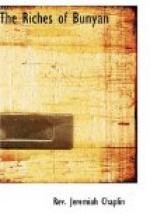rewritten in much of its phraseology, because he deemed
the original too rude for usefulness. In our own
day, one of the highest authorities as to the graces
and powers of our language, the English statesman
and scholar, T. B. Macaulay, has pronounced upon that
style, which Gilpin by implication so disparaged, the
most glowing eulogies. Schools and leisure and
wealth are useful, but they are not indispensable
either to felicity or to honor. Bunyan lacked
them all; and yet in the absence of them achieved greatness
—and what is far better, wide and enduring
usefulness. No man, with God’s exhaustless
Scriptures in his hands, and with the rich book of
nature and providence open in its pictured radiance
before his eyes, needs to have either a dwindling
or an impoverished soul. Of that latter volume,
the works of God, as of that former, the word of God,
Bunyan was evidently a delighted and unwearied student.
His references to birds and insects, flowers and running
brooks and evening clouds, and forests and mountains,
all show a man whose nature was genially awake to
the harmony and beauty of the material world that
lay in order and splendor around him. It was,
in Bunyan, no mere mimicry caught from books and companions—the
echo of any fashion of his times. He writes of
what he had seen with his own eyes; and seems to avoid
aiming at aught beyond that. Hence to the ocean,
which probably he never thus saw—and which
had he beheld it in its placid vastness, or in its
stormy wrath, he could not well have forgotten—his
writings contain, as far as we remember, no allusions,
in all the varied and exuberant imagery which they
employ. His books, more than those of his more
learned contemporaries, Richard Baxter, and John Owen,
that “mighty armor-bearer of the truth,”
as Bunyan happily calls him, were written exclusively
from the resources of his own personal observation.
And, in consequence of this, they have the freshness
and odors of the outer world pervading them—scents
and sounds of the highways along which, in the trampings
of his trade, he had plodded, and of the hedges that
had shaded him. To use the language of the patriarch’s
benediction, they have “The smell of
A field which the lord hath
blessed.” His books are, like Walton’s
Angler, of the open air, and the purling streams.
You catch, back of the good man’s Bible, as
he reverently ponders and commends it, glimpses of
rural landscapes, and of open skies—God’s
beautiful world, still lovely, even though sin has
marred it. Like the Sermon on the Mount, Bunyan’s
page has the traits of field-preaching. And it
was so, also, in his references to the inner world
of his own heart. He wrote not from the dried
specimens of earlier collectors—from the
shrivelled and rustling leaves of some old herbary—from
the philosophy and metaphysical analysis of other
men’s emotions, so much as from the glowing
records of his own consciousness and experience, the




